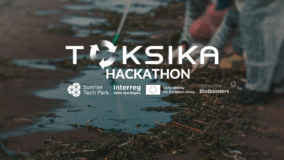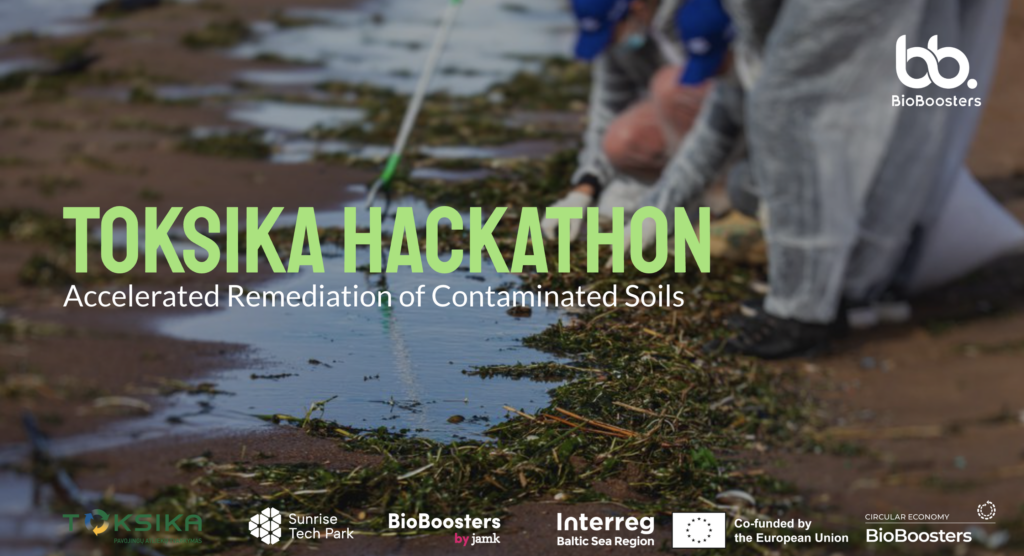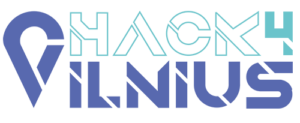
Toksika Hackathon
Join Toksika Hackathon – Innovate for Cleaner Soil!
TOKSIKA specializes in biological soil treatment and [...]
Join Toksika Hackathon – Innovate for Cleaner Soil!
TOKSIKA specializes in biological soil treatment and invites innovative proposals to accelerate the cleanup of petroleum-contaminated soils while preserving the delicate balance of microorganisms essential for the process. Contamination with petroleum products poses a significant environmental threat, disrupting ecosystems and slowing natural recovery efforts. TOKSIKA challenges you to design an efficient and environmentally friendly solution to enhance bioremediation without harming the microbial communities driving the cleanup.

ABOUT THE CHALLENGE: ACCELERATED REMEDIATION OF CONTAMINATED SOILS
Europe, with approximately 2.8 million potentially polluted sites identified by the European Environment Agency. Many of these sites, especially in industrial and former industrial regions such as Germany, France, the United Kingdom, Italy, and Eastern European countries like Poland, the Czech Republic, and Lithuania, are heavily polluted by petroleum products. These pollutants are typically found in areas associated with oil production or processing facilities, ports, and former military bases. The most common contaminants include crude oil, diesel, kerosene, and heavy fuel oil.
In Lithuania, this challenge is particularly significant. Since the 1990s, extensive work has been carried out to inventory and investigate polluted sites, including landfills, military bases, oil storage facilities, and gas stations. According to the Lithuanian Geological Survey, as of 2022, there are 12,520 identified potential pollution hotspots across the country. Of these, approximately40%—around 5,000 sites—are associated with petroleum-related activities, such as fuel stations, oil storage facilities, and vehicle maintenance yards, covering an estimated 600–700 hectares of land.
The environmental and health risks posed by these contaminated sites are severe. Petroleum products can degrade soil quality, harm ecosystems, and threaten water resources. Biological soil treatment, which uses microorganisms to break down contaminants, has emerged as a promising solution. However, the process is often slow and faces a significant challenge: ensuring the survival and effectiveness of the microorganisms during the cleanup process.
This hackathon's challenge focuses on: accelerating biological soil treatment for petroleum-contaminated (especially long-chain petroleum hydrocarbons) sites while preserving the viability of the microorganisms responsible for breaking down pollutants. By addressing this challenge, participants can contribute to a cleaner, healthier environment and create scalable solutions for soil remediation efforts, not only in Lithuania but across Europe and beyond.
More about the challenge you can learn HERE
TOKSIKA IS LOOKING FOR:
- Development of Bio-Stimulants or Nutrient Additives
- Microbial Consortia Engineering
- Optimized Environmental Parameters for Bioremediation
- Encapsulation or Protective Coating for Microorganisms
- Enzyme-Based Solutions
Create targeted bio-stimulants or nutrient formulations to enhance the activity and efficiency of microorganisms involved in the degradation of long-chain petroleum hydrocarbons. These additives could optimize microbial metabolism without harming their survival.
Design or identify microbial consortia (a combination of bacteria, fungi, or other microorganisms) that specialize in breaking down long-chain hydrocarbons. The focus could be on robust, naturally occurring, or genetically enhanced microorganisms that thrive in contaminated soil conditions.
Develop methods or technologies to monitor and optimize critical environmental factors like temperature, pH, oxygen levels, and moisture in the soil to create ideal conditions for microbial activity and hydrocarbon degradation.
Innovate protective encapsulation techniques to shield microorganisms from harsh environmental conditions or toxic by-products during bioremediation. This approach can ensure their survival and sustained activity throughout the process.
Develop enzyme-based treatments that work synergistically with microorganisms to break down long-chain hydrocarbons faster. This could include designing enzyme cocktails that target specific hydrocarbon bonds, reducing degradation time.
EVALUATION CRITERIA:
We welcome as participants startups, SMEs, research groups, student groups, consulting organizations, companies offering solutions to the challenge.
The evaluation criteria used to select the teams and finally the winner:
- ACCELERATION OF REMEDAIATION
- IMPACT TO MICROBIAL ECOSYSTEM
- SCALABILITY
- SAFETY AND REGULATORY COMPLIANCE
- INNOVATIVENESS AND NOVELTY
The solution’s ability to accelerate the breakdown of long-chain petroleum hydrocarbons in soil, demonstrating measurable improvements compared to existing methods.
The extent to which the solution ensures the survival and sustained activity of microorganisms involved in the bioremediation process, without causing harm or disruption to the microbial ecosystem.
The feasibility of scaling the solution for large-scale applications, considering factors such as cost-effectiveness, resource requirements, and ease of implementation.
The solution’s alignment with environmental sustainability, minimizing secondary pollution or harmful by-products, and adhering to safety and regulatory standards.
The originality and creativity of the solution, incorporating cutting-edge sciencetechnology, or new perspectives to address the challenge in a novel way.
OFFER FOR THE TEAMS:
The winner of the Hackathon receives a chance to establish a business relationship with TOKSIKA, including the possibility of preparing and implementing a joint development project / joint tests of the proposed solution. The travel cost of the selected teams to the Hackathon will be reimbursed by Bioboosters project.
TIME TABLE:
2025.03.27, 23:59 EET: Deadline for submitting an application
2025.04.01, 11:00 EET: Selection of teams published
2025.04.09, 14:00 EET: Online kick-off event where the participating teams will meet each other and representatives of the sponsoring company. At the kick-off event, representatives of company will tell the participating teams more about the challenge.
2025.05.6-7: Hackathon Days will take place in Vilnius at Sunrise Tech Park. At the end of the hackathon the winning team(s) will be selected. Participation in the Hackathon event is possible either on site in Vilnius or online based on agreement.
CONTACT PERSON:
Ignas Laimonas Tamašauskas, ignas@ssmtp.lt
ORGANIZERS:
Sunrise Tech Park is a non-profit organization, founded in 2003. The Park features long-standing traditions in the development of entrepreneurship, promotion of business and science collaboration, provision of infrastructure, and other innovation support services to young, innovative enterprises as well as to other knowledge-intensive businesses. The Park is a perfect place for innovative technological enterprises, enterprising members of the universities community, and an R&D environment, who aim to commercialize their knowledge, establish and develop businesses and expand innovative activity.
JAMK, Jyväskylä University of Applied Science has long experience in organizing hackathons. BioBoosters by JAMK is a Bioeconomy Business Accelerator that aims to create new businesses and globally significant solutions to combat climate change in the international bioeconomy environment. Accelerator’s key tasks are to develop business within bioeconomy and create sustainable business based on new innovations, utilizing new technologies and digitalization, developing abilities and know-how, and building business networks and ecosystems.
BioBoosters project network supports TOKSIKA Hackathon via communication and marketing cooperation. The network features 9 prominent bioeconomy innovation hubs around the Baltic Sea – from Finland, Sweden, Germany, Estonia, Latvia, Lithuania, and Poland. The BioBoosters project will organize a total of 18 Hackathons to support the sustainability mission of the bioeconomy companies. The project is co-funded via the Interreg BSR program and the European Regional Development Fund.

Hack4Vilnius
Hack4Vilnius – 7 kartus įvykęs ir jau tradicija tapęs Vilniaus miesto hakatonas, skirtas skatinti inovacijas Vilniaus mieste. Pirmą kartą hakatonas buvo organizuotas 2018 m. spalio 19–21 dienomis. Tęsiant tradicijas, hakatonas organizuojamas [...]
Hack4Vilnius – 7 kartus įvykęs ir jau tradicija tapęs Vilniaus miesto hakatonas, skirtas skatinti inovacijas Vilniaus mieste. Pirmą kartą hakatonas buvo organizuotas 2018 m. spalio 19–21 dienomis. Tęsiant tradicijas, hakatonas organizuojamas kasmet rudenį. 2020 m. dėl pandemijos renginys vyko virtualiai.
Hack4vilnius tikslas – ieškoti idėjų ir sprendimų, padedančių įveikti iššūkius, su kuriais susiduria sostinė, čia veikiantys verslai ir gyvenantys žmonės. Sprendimų ieškoma 4 srityse – sveikas, švarus, išmanus ir darnų judumą užtikrinantis miestas. Į šį renginį kasmet suburiamas didelis skaičius dalyvių, tarp kurių – programuotojai, dizaineriai, verslo vystytojai, įvairių krypčių studentai ar tiesiog noru prisidėti ir kurti spinduliuojantys žmonės. Hakatonas atviras visiems, todėl su tikslu kurti čia susiburia nuo jauniausių iki vyriausių, nuo gyvenančių Lietuvoje iki atvykusių iš įvairiausių kraštų, pavyzdžiui, Kolumbijos, dalyviai. Hack4Vilnius metu dalyvius konsultuoja stipri ekspertų iš įvairių sričių komanda, o įgyti reikiamų žinių ir motyvacijos padeda hakatono metu vykstančios paskaitos bei mokymai.
Daugiau informacijos:

NANDO Hackathon
NANDO sprendžia daugiapusius perteklinio tręšimo iššūkius, kuriems reikalingi novatoriški sprendimai. Tvarios žemės ūkio praktikos kūrimas ir aplinkai draugiškų alternatyvų tradiciniams azoto pagrindo trąšoms diegimas yra esminiai [...]
NANDO sprendžia daugiapusius perteklinio tręšimo iššūkius, kuriems reikalingi novatoriški sprendimai. Tvarios žemės ūkio praktikos kūrimas ir aplinkai draugiškų alternatyvų tradiciniams azoto pagrindo trąšoms diegimas yra esminiai žingsniai. Šie sprendimai siekia ne tik sumažinti trąšų poveikį aplinkai, bet ir skatinti ilgalaikę ekosistemų bei bendruomenių sveikatą.
NANDO kviečia sukurti novatorišką sprendimą, kuris padėtų spręsti perteklinio tręšimo problemą, atsirandančią dėl nesaikingo trąšų naudojimo Europos ūkiuose. Atsižvelgiant į idėjos brandumą, NANDO siūlo hakatono dalyviams galimybę bendradarbiauti verslo srityje arba pradėti bendrą projektą ar pilotinį testavimą, siekiant įgyvendinti pristatytą idėją.

Kokia yra iššūkio esmė?
NANDO sprendžia aktualią Europos žemės ūkiui perteklinio tręšimo problemą, kuri kelia didelę grėsmę aplinkos ir žemės ūkio tvarumui. Įmonė kuria ir siūlo rinkai biostimuliatorius, paviršiaus aktyviąsias medžiagas ir cheminius produktus, skirtus naudoti augalininkystėje, gyvulininkystėje bei įvairiose pramonės šakose. Pasitelkdama inovacijas, ji sujungia biotechnologijos, chemijos ir inžinerijos mokslo pasiekimus.
Nekontroliuojamas trąšų, ypač azoto ir fosfatų, naudojimas sukėlė daugybę tarpusavyje susijusių problemų Baltijos jūros regione ir visoje Europos Sąjungoje. Viena pagrindinių problemų yra vandens tarša. Perteklinis trąšų naudojimas lemia jų išplovimą į vandens telkinius, juos užteršiant. Ši tarša sukelia eutrofikaciją, kuri pasireiškia dumblių žydėjimu, sumažinančiu deguonies kiekį vandens ekosistemose. Dėl to nukenčia žuvys ir kita vandens gyvybė, o vandens kokybė smarkiai pablogėja.
Bendradarbiaujame su:
JAMK – Jyväskylos taikomųjų mokslų universitetu, turinčiu ilgametę patirtį organizuojant hakatonus. BioBoosters by JAMK – tai bioekonomikos verslo akseleratorius, kurio tikslas – kurti naujas įmones ir pasauliniu mastu reikšmingus sprendimus, skirtus kovoti su klimato kaita tarptautinėje bioekonomikos aplinkoje. Akseleratoriaus pagrindinės užduotys – plėtoti verslą bioekonomikos srityje, kurti tvarius verslus, paremtus naujomis inovacijomis, pasitelkti naujas technologijas ir skaitmenizaciją, ugdyti gebėjimus ir žinias bei kurti verslo tinklus ir ekosistemas.
BioBoosters projekto tinklas prisideda prie „Nando Hackathon“ renginio, teikdamas komunikacijos ir rinkodaros pagalbą. Šis tinklas vienija 9 svarbius bioekonomikos inovacijų centrus aplink Baltijos jūrą – Suomijoje, Švedijoje, Vokietijoje, Estijoje, Latvijoje, Lietuvoje ir Lenkijoje. BioBoosters projektas planuoja surengti iš viso 18 hakatonų, siekiant palaikyti bioekonomikos įmonių tvarumo tikslus. Projektas bendrai finansuojamas pagal Interreg BSR programą ir Europos regioninės plėtros fondą.
